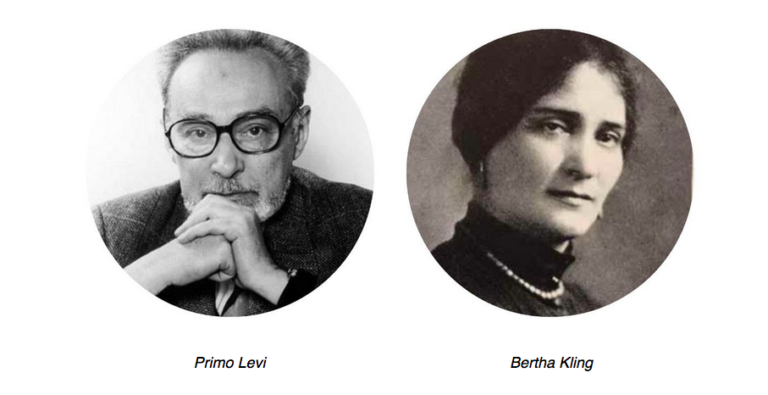The memorable Poets of the Past program, featuring Italian-born Holocaust poet, Primo Levi (1919-1987) and Belarus-born Yiddish poet, Bertha Kling (1886-1978), was held last month in the Astor Judaica Library at the Lawrence Family Jewish Community Center.
It was particularly meaningful having Dr. Andrew Viterbi introduce the life of Primo Levi, who was his cousin.
Viterbi, born and raised in Boston, had his Bar Mitzvah in Turin, Italy, home to Levi and many other members of the Viterbi family. It was in 1948, at his Bar Mitzvah celebration, that the thirteen-year-old boy first met the celebrated chemist and author who, thanks to his chemistry background, managed to survive the trauma of a year in Buna, a subsidiary camp to the infamous Auschwitz Concentration Camp. By this time, Levi was devoting himself entirely to his Holocaust writings.
After the biographical introduction, Levi’s poems were read, first in their English translations, then in their Italian originals. Myla Wingard in English and Paula Matthews in Italian opened the program with powerful readings of Buna, and Shema. Matthews, an Italian professor in the Language Department of Mesa College, delivered Shema from memory, because it was her favorite Levi poem.
Other English readers of the ten Levi poems were Jordan Fruchtman, newly appointed Chief Program Officer at the JCC, Michael Horvitz and Leean Knetzer, members of the Jewish Poets—Jewish Voices Committee and Shelley Druskin, retired UCSD academic counselor.
The Italian readers included two fellow Italian professors whom Paula Matthews recruited, Dr. Lorendana Di Martino from the Department of Languages, Cultures and Literatures, USD and Dr. Clarissa Clo, Chair, Department of European Studies, SDSU. Monique Kunewalder, a polyglot who is conversant in French, Spanish, Italian, German, English and a smattering of Slavic languages, read two of Levi’s lighter poems, La mosca (The Fly) and Il dromedario (The Dromedary).
Dr. Viterbi read two poems in their original Italian, a language he has spoken since childhood, Pasqua (Passover) and Il Sopravvissuto (The Survivor).
He mentioned, however, that his favorite of Levi’s poems was Shema and recalled how he once read it in Auschwitz, when he accompanied a group of Italian High School students there.
Although Paula Matthews had committed the poem to memory, she had brought the text along. Matthews walked up to Viterbi and placed the text before him.
After some urging, he read Shema once again. This was one of the most moving moments of the evening.
The English translation:
SHEMA
You who live secure
in your comfortable homes,
who return each evening to find
warm food and a hearty welcome …
Consider: is this a “man”
who slogs through mud,
who has never known peace,
who fights for scraps of bread,
who lives at another man’s whim,
who at his “yes” or his “no” lies dead.
Consider: is this a “woman”
shorn bald and bereft of a name
because she lacks the strength to remember,
her eyes as void and her womb as frigid
as a winter frog’s?
Consider that such horrors have indeed been!
I commend these words to you.
Engrave them in your hearts
when you lounge in your beds
and again when you rise,
when you venture outside.
Repeat them to your children,
or may your houses softly crumble
and disease render you equally as humble
so that even your offspring avert their eyes.
The second half of the program opened with the biography of Bertha Kling, followed by two of her songs sung by Elisheva Edelson, Az es heybt zikh on der tog (When the Day Begins), and Leyg Ikh mir in bet (I Lay Myself in Bed).
The English readers for the seven Kling poems that followed were Judith Rubenstein, Dr. Carla Grosmann and Jane Zeer, a member of the Jewish Poets—Jewish Voices Committee. The Yiddish readers were JP—JV Committee member, Janice Alper, and Mexican-born Yiddish speakers, Maty Feldman Bicis and Sylvia Rosenthal. Elisheva invited Jessica Lemoine, a member of the Ohr Shalom Choir, which Elisheva conducts, to join her in the song that concluded the program, Dermutikt mikh Got (Give me Courage God).
Bertha Kling was not only published in over a dozen Yiddish literary journals, but three slim volumes were devoted to her poems. For more than half a century, her Bronx apartment served as a social meeting place for young poets, writers and artists, whose talents she nurtured.
The English translation of one of Kling’s poems:
You pressed me close
You pressed me close
To you,
And didn’t realize
That a button from your sleeve
Was stuck in my hair
And tore some out.
I closed my eyes
In joy and pain,
Bit my lip,
And stayed silent.
All the readers conveyed their assignments with dramatic conviction.
The Jewish Poets—Jewish Voices Committee will be meeting during the summer to plan their 2023-24 season. They will select local poets for three programs, which will also include a half hour of open mic, and two Jewish poets of the past for the program of that name. If you have any suggestions for local poets or student poets, please contact Melanie Rubin, Director of Senior and Adult Programming: melanier@lfjcc.org.
Republished from San Diego Jewish World


























